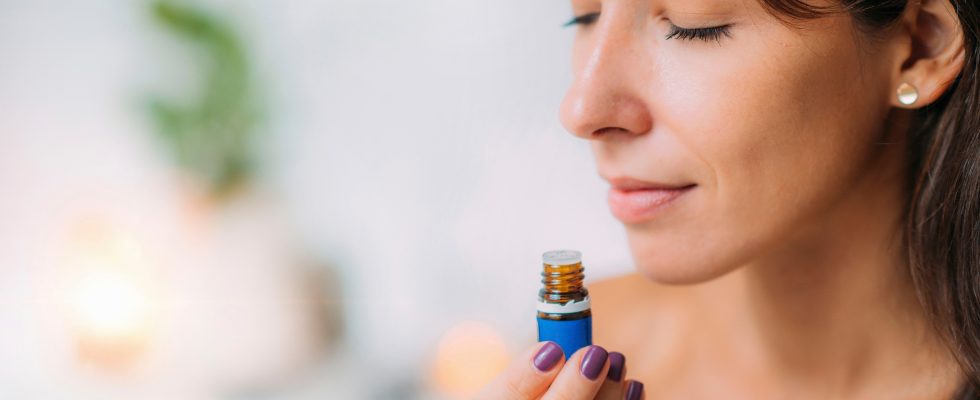René-Maurice Gattefossé (1881-1950) was the third of five children. His father founded the “Établissements Gattefossé” which produced essential oils for the perfume industry. René-Maurice studied chemical engineering in Lyon before joining the family business where he was in charge of research on essential oils. But a tragedy turned his life upside down.
In 1910, an explosion occurred in the company’s laboratory and René-Maurice Gattefossé was seriously burned. His wounds became infected and gangrenous. As a last resort, he removed his bandages and applied lavender essential oil to his wounds. This unorthodox gesture was followed by a miraculously rapid healing of the wounds.
As with many anecdotes of this nature, it is difficult to know if everything is true. But this incident marked the birth of a new alternative therapy. Gattefossé has long believed in the healing virtues of its essential oils. He was now certain of this and coined a name for his healing method: aromatherapy.
Today, it is one of the most popular alternative treatments. The global market for essential oils – the name is derived from “essence” and does not mean “essential” as in “vital” – is expected to reach $4.7 billion by 2030 and is currently growing at an annual rate of 12%. Aromatherapy typically involves the application of diluted essential oils through a gentle massage to the body. More rarely, essential oils are ingested, inhaled or added to bath water. The relaxing effect of aromatherapy massage is largely due to the gentleness of the massage itself rather than any specific effects of the essential oils.
Aromatherapy, almost a panacea for its followers
However, aromatherapists claim that essential oils have very specific properties that can be used to treat specific conditions. For example, bergamot from the Citrus Bergamia tree is said to be effective against stress, depression, anxiety, anorexia, psoriasis and eczema. It is also used to stimulate the liver, digestive system and spleen, and to give a boost to people suffering from general malaise. Cedarwood essential oil is also said to relieve stress, anxiety, respiratory conditions, skin problems and urinary infections, while providing “spiritual support” (sic). Soothing in infusion, chamomile, in essential oil form, is said to be a powerful calmant, an antibiotic, an antiseptic, an antidepressant and a general mood enhancer when used. Lavender, one of the most popular oils, also relieves stress, and acts as an antiseptic, antidepressant, anti-inflammatory, decongestant, deodorant, diuretic and sedative…
However, such assertions are based on wishful thinking, rather than scientific data. A review of clinical trials on aromatherapy found some evidence for relaxation but concluded that “the effects of aromatherapy are probably not strong enough for it to be considered in the treatment of anxiety. The hypothesis “that it would be effective for any other indication is not supported by the results of rigorous clinical trials.” A more recent review identified clinical studies in hypertension, depression, anxiety, pain and dementia. But for none of these pathologies was the evidence convincing.
Aromatherapy is often considered to be safe, but this is not entirely true. Our analysis of adverse effects concluded that “aromatherapy may have adverse effects, some of which are serious.” A recent study even linked certain essential oils to epileptic seizures. And even if essential oils were completely harmless, they could still kill, if used as an alternative to effective treatment for a life-threatening illness.
A study “too good to be true”
What about the olfactory pathway, that is to say the effects of the smell of essential oils without the pleasant massage? We can probably all agree that scents can affect us in different ways. A recent American study made headlines around the world. The researchers randomly assigned 43 elderly people to either a “smell-enriched” group or a control group. The first were exposed for two hours to seven different scents per week, one per night, using an odor diffuser. People in the control group breathed in only minimal amounts of odorants. Neuropsychological assessments and functional MRIs were performed at the start of the study and after 6 months. The results showed a 226% (!) improvement in the memory test for the treated group compared to the control group. In addition, an improvement in brain functions was observed.
If these results prove accurate, they mean we could avoid some of the cognitive decline of old age by simply sniffing essential oils while we sleep. But are they true? Many experts pointed out that the study had many flaws – the most obvious being its size, which was far too small to draw definitive conclusions – and that its results seemed too good to be true.
So we should wait for more convincing research before rushing to the next health food store and stocking up on all the essential oils on offer. In the meantime, we can probably enjoy some of these products from time to time – not for their effects on our health, but for their pleasant scents.
* Emeritus Professor, University of Exeter, United Kingdom.
